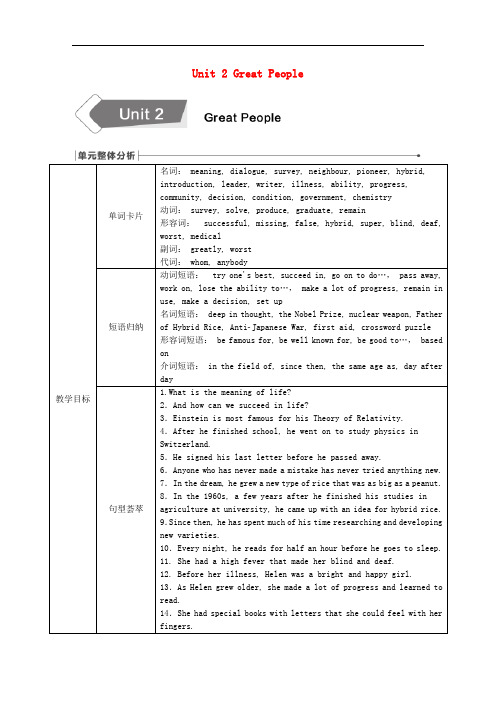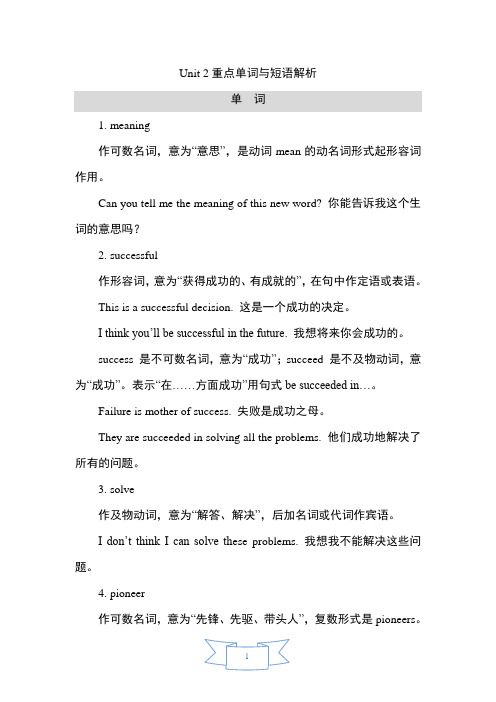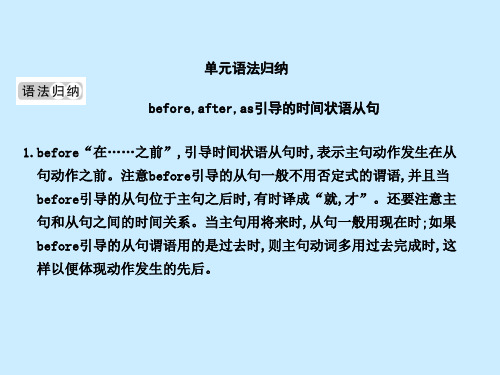2014年秋九年级英语上册 Unit 2 Great People状语从句的用法 (新版)冀教版
- 格式:doc
- 大小:33.50 KB
- 文档页数:2

冀教版英语九上Unit2《GreatPeople》(Lessons10-12)课文重点整理新冀教版九年级上册Unit2课文重点整理(Lessons 10-12)Unit 2: Great PeopleLesson 10: Touch the World1、hear of ____________________________ at the age of 88______________________have a high fever____________________ be filled with________________________make progress______________________ be famous for________________________try her best to do sth._________________ be greatly missed_____________________the blind / deaf______________________ be a model for_______________________2、 Helen Keller, the well-known writer and educator, died yesterday at the age of 88.先看例句:Zhao Wei, the actress and singer, ______ (be) popular with most young people.在句中,the actress and singer 指的是一个人,演员兼歌手。
解析如下:①“a / the+单数名词+and+单数名词”,指的是同一个人或物,谓语动词用单数形式。
如:那位作家兼老师要来了。
_____________________________________________________②“a / the+单数名词+and+ a / the+单数名词”,指的是两个人或物,谓语动词用复数形式。

冀教版英语九年级全册Unit 2 Great People 重难点知识归纳总结【重点单词】1.meaning /'miːnɪŋ/ n. 意义;意思2.dialogue /'daɪəlɒg/ n. 对话;对白3.successful /sək'sesfʊl/ adj. 获得成功的;有成就的4.missing /'mɪsɪŋ/ adj. 缺少的;丢失的5.survey /ˈsəːveɪ/ v. 调查/ˈsɜːveɪ/ n. 调查6.neighbour /'neɪbə/ n. 邻居7.universe /'juːnɪvɜːs/ n. 宇宙;万象8.lifetime /'laɪftaɪm/ n. 一生;终生9.solve /sɒlv/ v. 解决;解答10.theory /'θɪərɪ/ n. 理论;学说11.relativity /relə'tɪvɪtɪ/ n. 相对性12.Switzerland /ˈswɪtsələnd/ n. 瑞士13.pioneer /paɪə'nɪə/ n. 先锋;先驱14.nuclear /'njuːklɪə/ adj. 核能的15.weapon /'wep(ə)n/ n. 武器16.conclusion /kən'kluːʒ(ə)n/ n. 结论17.false /fɔːls/ adj. 错误的;假的18.peanut /'piːnʌt/ n. 花生19.hybrid /'haɪbrɪd/ adj. 杂交的n. 杂交植物(动物)20.variety /və'raɪətɪ/ n. 品种;变化21.introduction /,ɪntrə'dʌkʃ(ə)n/ n. 采用;引进;推行22.leader /'liːdə / n. 领导者;领袖23.production /prə'dʌkʃ(ə)n/ n. 生产,制造;产量24.produce /prəˈdju:s/ v. 生产;出产25.super /'suːpə/ adj. 超级的26.planetary /'plænɪt(ə)rɪ/ adj. 行星的27.writer /'raɪtə/ n. 作家cator /'edʒʊkeɪtə/ n. 教育家;教育工作者29.blind /blaɪnd/ adj. 失明的;瞎的30.deaf /def / adj. 失聪的;聋的31.illness /ˈɪlnəs/ n. 疾病32.ability /əˈbɪlətɪ/ n. 能力33.progress /'prəʊgres/ n. 进展;进步munity /kəˈmju:nətɪ/ n. 社区;社会35.greatly /'greɪtlɪ/ adv. 非常;很36.graduate /ˈɡradʒʊeɪt/ v. 毕业37.remain /rɪ'meɪn/ v. 仍然是;保持不变38.anti- /'æntɪ/ prefix 反;反对39.decision /dɪ'sɪʒ(ə)n/ n. 决定40.aid /eɪd/ n. 帮助;援助41.worst /wə:st/ adj. & adv. (bad或badly的最高级) 最坏的(地);最糟的(地)42.condition /kən'dɪʃ(ə)n/ n. 环境;条件;状态;状况43.operate /'ɒpəreɪt/ v. 动手术;做手术ernment /ˈgʌvənmənt/ n. 政府45.medical /'medɪk(ə)l/ adj. 医疗的;医学的46.crossword /'krɒswɜːd/ n. 纵横字谜47.puzzle /'pʌz(ə)l/ n. 谜;智力游戏48.based /beɪst/ adj. (以……)为基础;(以……)为依据49.whom /huːm/ pron. (用作动词或介词的宾语)谁50.anybody /'enɪbɒdɪ/ pron. 任何人51.chemistry /'kemɪstrɪ/ n. 化学【重点短语】1.the meaning of... ……的意义2.wonder about 对……感到疑惑3.succeed in 在……方面成功4.try one’s best to do sth 尽某人最大的努力做某事5.live a good and happy life 过一种美好幸福的生活6.be good to sb 对某人友好7.seem like看起来像……8.write ... down 写下……9.go on to do sth 继续做某事10.in the field of 在……领域11.pass away 去世12.give up 放弃13.nuclear weapon 核武器14.stop doing sth 停止做某事15.make a mistake 犯错16.allow sb to do sth 允许某人做某事17.since then 从那时起18.together with 和……一起e up with 提出,想出20.be filled with 充满21.graduate from 从……毕业22.because of 由于23.in one’s spare time在某人的空闲时间24.make a lot of progress 取得很大的进步25.learn to do sth 学会做某事26.make a decision to do sth 决定做某事27.first aid 急救28.set up 建立29.day after day 日复一日【重点句型】1.It seems like something is missing.好像少了点什么。


Unit 2重点单词与短语解析单词1. meaning作可数名词,意为“意思”,是动词mean的动名词形式起形容词作用。
Can you tell me the meaning of this new word? 你能告诉我这个生词的意思吗?2. successful作形容词,意为“获得成功的、有成就的”,在句中作定语或表语。
This is a successful decision. 这是一个成功的决定。
I think you’ll be successful in the future. 我想将来你会成功的。
success 是不可数名词,意为“成功”;succeed 是不及物动词,意为“成功”。
表示“在……方面成功”用句式be succeeded in…。
Failure is mother of success. 失败是成功之母。
They are succeeded in solving all the problems. 他们成功地解决了所有的问题。
3. solve作及物动词,意为“解答、解决”,后加名词或代词作宾语。
I don’t think I can solve th ese problems. 我想我不能解决这些问题。
4. pioneer作可数名词,意为“先锋、先驱、带头人”,复数形式是pioneers。
As a technician, he is a remarkable pioneer. 作为技术人员,他是个了不起的先驱。
5. introduction作可数名词,意为“初次投入使用、引进、推进、介绍”,它是动词introduce的名词形式。
The introduction of this new skill brings many changes to us. 这种新技能的引进给我们带来了很多变化。
6. leader作可数名词,意为“领导者、领袖”,它是动词lead 的名词形式,复数形式是leaders。


Unit 1重点词汇和短语解析单词1. regret作及物动词,意为“对……感到后悔”,后加名词、代词、V-ing 形式作宾语。
如:I regret making such a foolish decision. 我后悔做出这么愚蠢的决定。
作不可数名词,意为“遗憾、惋惜”。
如:His great regret is not seeing his father for the last time. 他最大的遗憾是没有能最后一次见他父亲一面。
2. fever作不可数名词,意为“发热、发烧”,短语have a fever意为“发烧”。
如:Linda has a cold and she has a fever now. 琳达感冒了并且现在还在发烧。
3. examination作可数名词,意为“考试、体检、检查”,有时可缩写为exam。
如:The students are getting ready for the examination. 学生们正在为考试做准备。
4. refuse作不及物动词,意为“拒绝、回绝”,后面的动词可用不定式形式。
如:She refused to travel with us. 她拒绝和我们一起去旅行。
作及物动词,意为“拒绝给予”,后加名词或代词作宾语。
如:The United States has refused him a visa. 美国拒绝给他发放签证。
5. German作可数名词,意为“德国人”,注意它的复数形式是Germans。
如:What are those Germans doing over there? 那些德国人在那边做什么呢?6. Asian作形容词,意为“亚洲的”,是名词Asia的形容词形式,在句中多作定语。
如:People in East Asian countries like eating tofu. 东亚国家的人们喜欢吃豆腐。
作可数名词,意为“亚洲人”,复数形式是Asians。
Unit 2 Great People[before, after和as引导的时间状语从句&that和who引导的定语从句]1. After he finished school, he went on to study physics in Switzerland.毕业后他去瑞士继续研究物理学。
2. He signed his last letter before he passed away.在去世之前,他签署了他的最后一封信。
3. As Helen grew older, she made a lot of progress and learned to read. 随着年龄的增长,海伦取得了很大进步并学会了阅读。
4. Anyone who has never made a mistake has never tried anything new. 一个从不犯错误的人,一定从来没有尝试过任何新鲜事物。
5. In the dream, he grew a new type of rice that was as big as a peanut.在梦里,他种植了一种像花生一样大的新型水稻。
一、before, after 和as 引导的时间状语从句1.before, after和as都可以引导时间状语从句。
before意为“________________”;after意为“________________”; as 除了表示“随着……”,还可以表示“正当……时”和“一边……一边……”。
The students were talking as the teacher came in.当老师进来时学生们正在说话。
We always sing as we walk.我们总是边走边唱。
2.当时间是将来的时候, before, after和as引导的时间状语从句常用________时态,而主句要用________时态。
Unit 2 Great People
状语从句在主从复合句中作状语,根据它们表达含义的不同,状语从句可以分为时间状语从句、地点状语从句、条件状语从句、让步状语从句、原因状语从句、目的状语从句、比较状语从句、结果状语从句、方式状语从句等。
(一)时间状语从句
1.由 before, after引导的时间状语从句
before 表示从句动作在主句动作之前,after表示从句动作在主句动作之后。
如:Before he reached the station, the train had gone. 他赶到车站之前,火车就开了。
After they had finished the work, they went home. 他们完成工作之后就回家了。
2.由as soon as 引导的时间状语从句
We went home as soon as the rain stopped. 雨一停我们就回家了。
3.由till, until引导的时间状语从句,如:
We waited until they came back. 我们一直等到他们回来。
We didn’t go home until they came back. 直到他们回来我们才回家。
注意:在带有时间状语从句的复合句中,如果主句是一般将来时,从句应该用一般现在时表达将来含义。
如:
You can go out to play after you finish your homework. 你做完作业后就可以出去玩了。
(二)条件状语从句
条件状语从句往往用if或unless引导,它们的意思分别是“如果”和“如果不”。
如:You’ll make progress if you work hard.如果你努力,你就会取得进步。
You’ll nev er make progress unless you work hard. 如果你不努力,你就不会取得进步。
注意:在带有条件状语从句的复合句中,如果主句是一般将来时,从句应该用一般现在时表达将来含义。
如:
We’ll go skating if it doesn’t snow.如果天不下雪我们就去滑冰。
(三)地点状语从句
地点状语从句往往用where, wherever引导。
如:
Go back where you came from. 你从哪里来就回哪里去。
Wherever you go, yo u’ll be warmly welcomed.不论你走到哪里,你都会受到热烈欢迎的。
(四)让步状语从句
1.由though, although 引导是让步状语从句,它们的意思是“虽然”,从句所指的内容是事实。
如:
Although he is old, he still studies hard. 他虽然年纪大了,但仍然在努力学习。
Though she is a child, she has to help support the family. 虽然她还小,但不得不帮着供养家庭。
2.由no matter what (which, who, whose, how, where, when) 和whatever, whichever, whoever, whosever, however, wherever, whenever等引导的让步状语从句,这些词语的意思是“无论什么(哪一个、谁、谁的、怎样、哪里、什么时候)。
如:
No matter what (Whatever) he may say, I won’t change my mind.不论他说什么,我都不会改变我的主意。
No matter where (Wherever) you go, I’ll be with you.无论你到哪里,我都会和你在一起。
状语从句来报到(下)
(一)原因状语从句
连词because, since, as用来引导原因状语从句。
其中because表示原因的语气最强,所引导的从句是整个句子的重心,在口语中有时省略主句而单独成句;since往往被译成“既然”,比because的语气要弱,表示已知或很明显的理由,常常是间接或附带的理由,不是全句的重心,但往往放在句首;as表示原因时语气更弱,多用于口语中,大多放在句首,对主句加以说明,如果放在句尾,表示的语气会更弱,主句和从句都是信息重心。
如:He couldn’t see anything in the room because there was nothing in it. 他看不到房间里有什么东西,因为里面什么都没有。
As I am ill, I won’t go with you. 我生病了,不和你们一起去了。
Since everyone is here, let’s start. 既然大家都来了,咱们出发吧。
(二)目的状语从句
目的状语从句一般由in order that 和so that引导,其中,in order that 可以用在句首,也可用在句中;而so that 只能用在句中。
如:
He came in quietly in order that he shouldn’t wake up his wife. = In order that he shouldn’t wake up his wife, he came in quietly. 他轻轻地进了屋,以免把妻子吵醒。
You should study hard so that you can keep with others. 你应该努力学习,以便能赶上其他人。
(三)结果状语从句
1.由so, so that 引导的结果状语从句,它们的意思是“以致于、所以”。
如:
They missed the bus so that they were late for the meeting. 他们误了车,所以开会迟到了。
2.由so…that…和such…that…引导的结果状语从句。
如:
The report is so important tha t we can’t miss it. 这个报告太重要了,我们不能错过。
This is such a heavy box that nobody here can carry it. 这是一个很重的箱子,这儿没人能把它扛起来。
(四)方式状语从句
1.由as 引导的方式状语从句, 如:
Do as I do. 我怎么做,你就怎么做。
All plants need air as they need water. 所有植物都需要空气,就像需要水一样。
2.由as if和as though 引导的方式状语从句。
如:
He speaks English as if (though) he were an Englishman. 他讲起英语来好像是个英国人。
She walks as if she is ill. 她走路的样子好像生病一样。
(五)比较状语从句
比较状语从句一般用as, than引导。
如:
She works as hard as her workmates.她和她的同事们工作一样努力。
This bedroom is brighter than that one. 这间卧室比那间卧室要明亮。